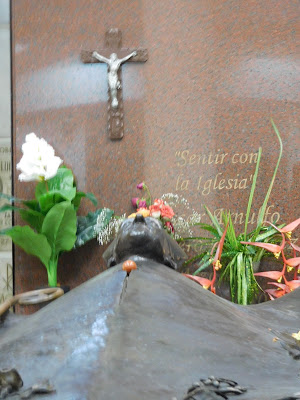The phrase from the Gospel (Luke 13:22-30) that hits me is “Strive to enter through the narrow gate.” In Spanish it reads a bit more forcefully: “Esfuércense por entrar por la puerta, que es angosta”. “make an effort, exert yourself, to enter by the gate that is narrow. The Greek is Ἀγωνίζεσθε εἰσελθεῖν διὰ τῆς στενῆς θύρας - struggle to enter by the narrow door.
The Lord calls us to a struggle, because there are so many distractions and offers of an effortless life, which offer a false consolation.
But, as I began to struggle with the text, I couldn’t get out of my mind an experience I had in 2004 when I was visiting the Holy Land.
I stayed with a friend in the Palestinian city of Bethlehem and visited parts of Palestine and Israel, often with him.
Being in Bethlehem, I visited the Church of the Nativity several times. One morning I got up early for Mass near the site of the nativity. But before that, I had visited the church with my friend and entered the church by the Door of Humility.
There used to be three doors to the church but two are walled up and the third one was refashioned in the times of the Ottoman Empire.
The Door of Humility is less than five feet high and you have to stoop to enter the church.
Many have reflected that this door reminds us that we must be humble, remembering our status as creatures made from the earth – humus.
We also are called to remember that we are entering the place when God became human, taking on our flesh, “humbling himself” (Philippians 2: 6-8).
But there is another lesson to be learned when we recall the origin and purpose of this door. It’s important to that it was reconstructed during the Ottoman control of the Holy Land (and much of the Levantine Mid-East.)
The door is low to prevent soldiers entering on their horses.
To enter the birthplace of the Prince of Peace, we have to disarm, to dismount, putting ourselves on the level of others.
This reflects the wisdom of the psalms:
“Some rely on chariots, others on horses, but we on the name of the Lord our God,” reads Psalm 20:8.
“Useless is the horse for safety; despite its great strength, it cannot be saved,” reads Psalm 33:17 in the NAB translation; the NRSV is more pointed: “The war horse is a vain hope for victory, and, by its great might, it cannot save,” as is the Grail translation, “A vain hope for safety is the horse; despite its power it cannot save.”
To enter the church of the Nativity we have to leave behind the false defenses of our personal lives as well as the security policies of the nations that trust in their weapons.
The narrow door, the low door of humility calls us to disarmament – of the nations and of the heart.
Dorothy Day in 1938, during the Spanish Civil War, wrote of the need of the disarmament of the heat.
Yes, we must work for the disarmament of the nations as well as the disarmament of our cities, where all too many weapons lead to murders and mass killings.
But this must come from a disarmed heart, getting down off our high horses, laying aside our supposed superiority, renouncing attacks on our neighbors, and encountering the Lord Jesus in a manger, defenseless, surrounded by all our sisters and brothers.
-------
The full text of Dorothy Day's remarks put the disarmament of the heart in the context of the call to holiness.
“Today the whole world is in the midst of a revolution. We are living through it now – all of us. History will record this time as a time of world revolution. And frankly, we are calling for Saints…. We must prepare now for martyrdom — otherwise we will not be ready. Who of us if … attacked now would not react quickly and humanly against such attack? Would we love our brother [or sister] who strikes us? Of all at The Catholic Worker, how many would not instinctively defend [themselves] with any forceful means in [their] power? We must prepare. We must prepare now. There must be a disarmament of the heart.”









